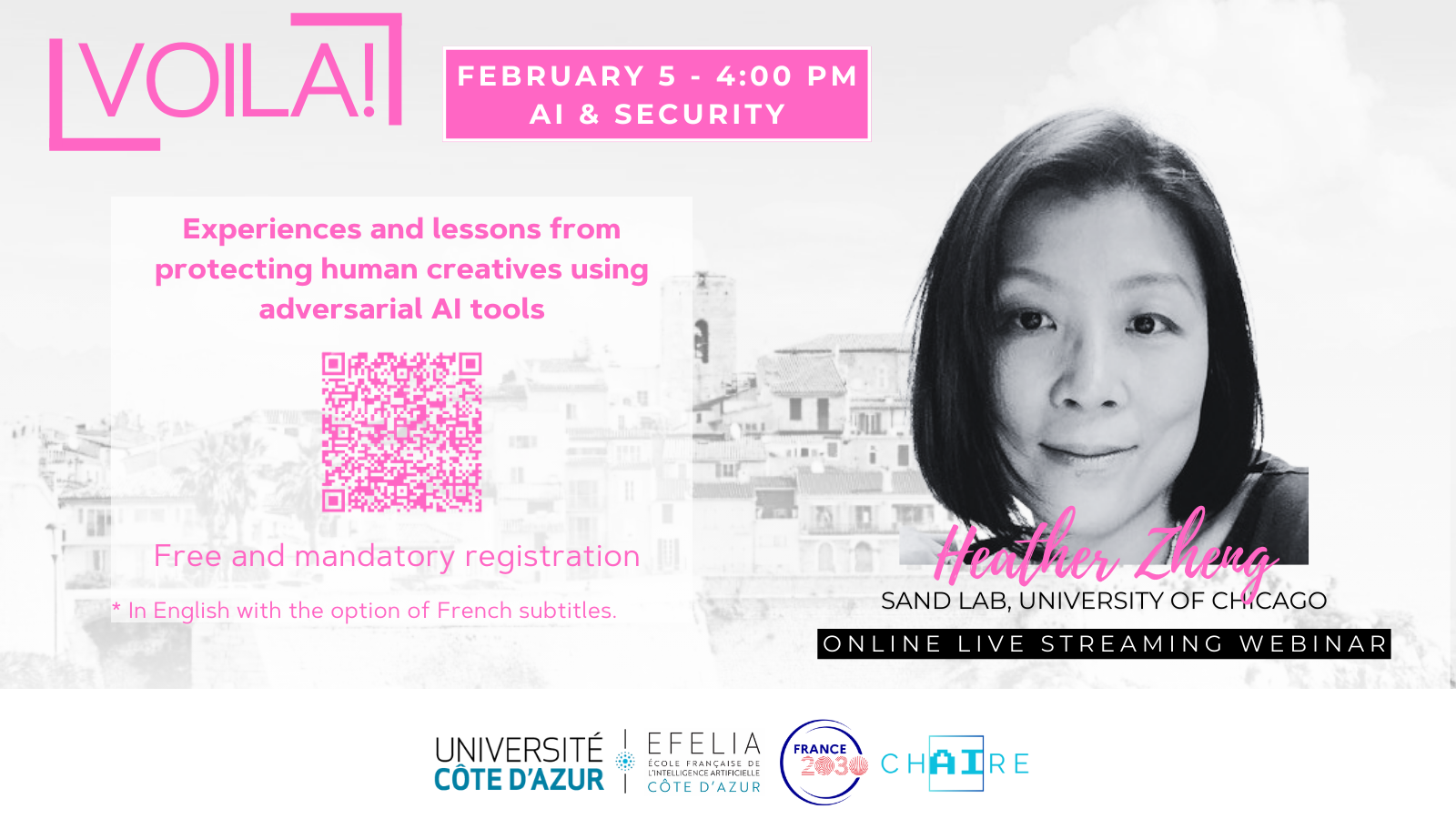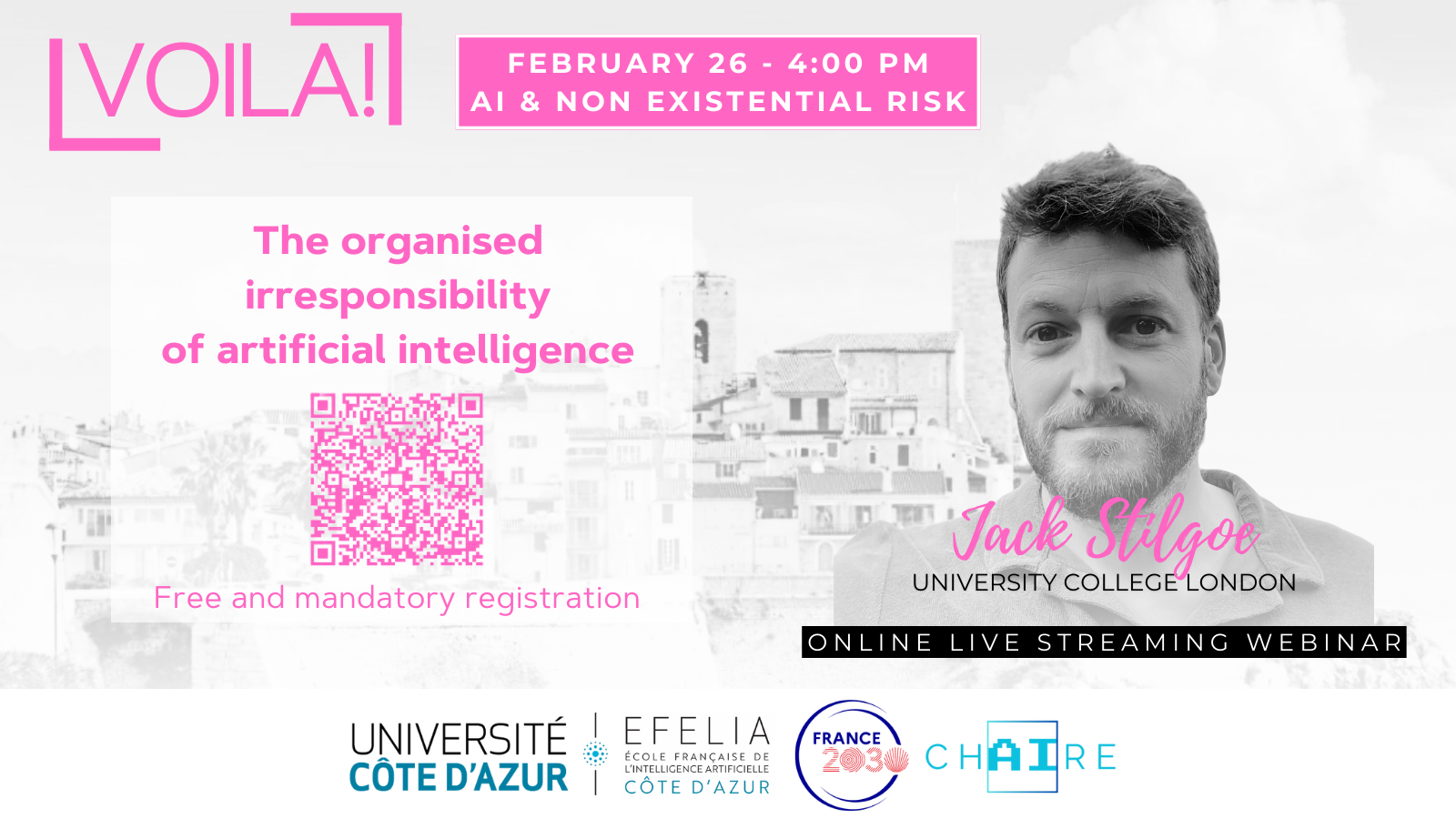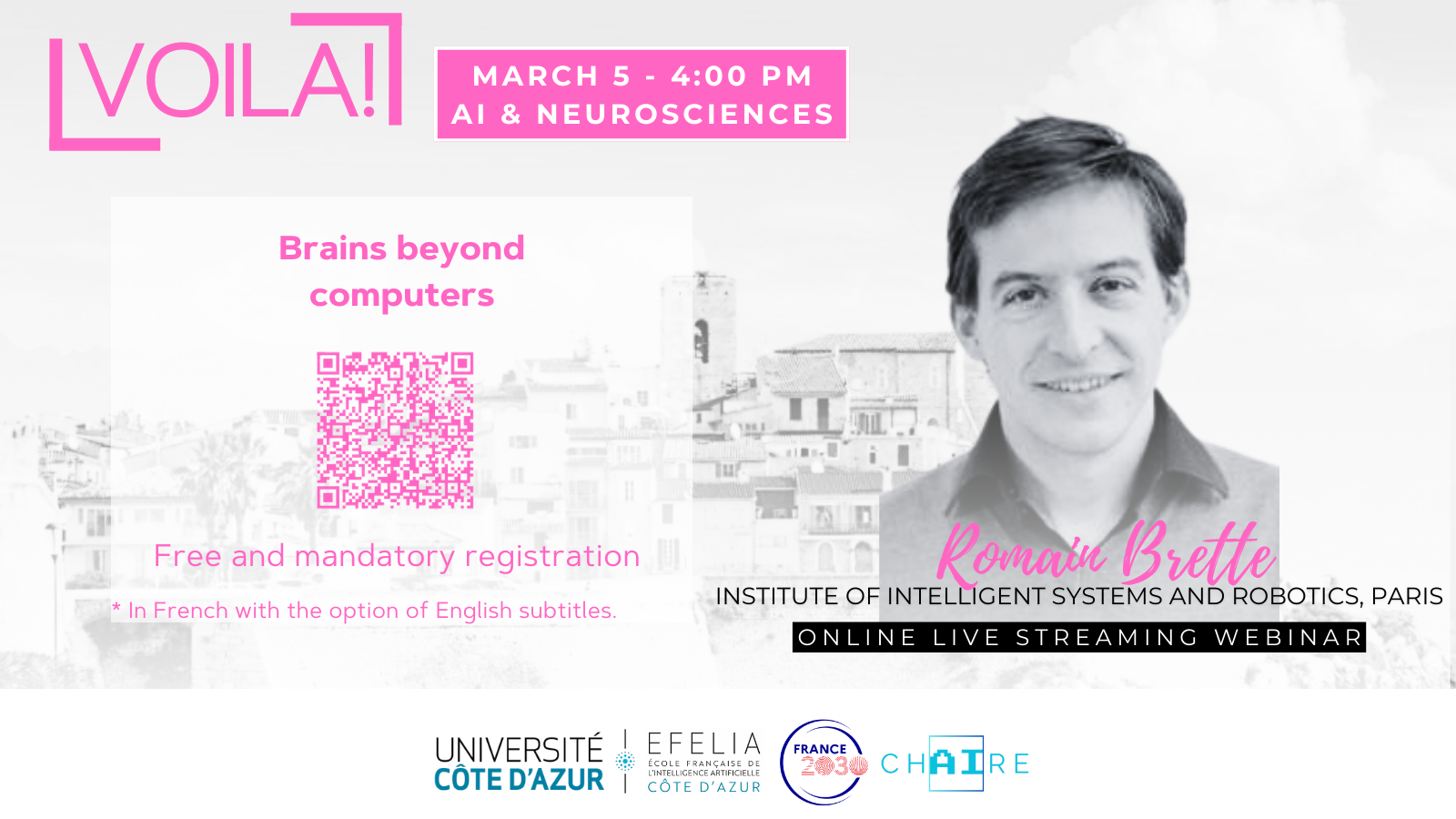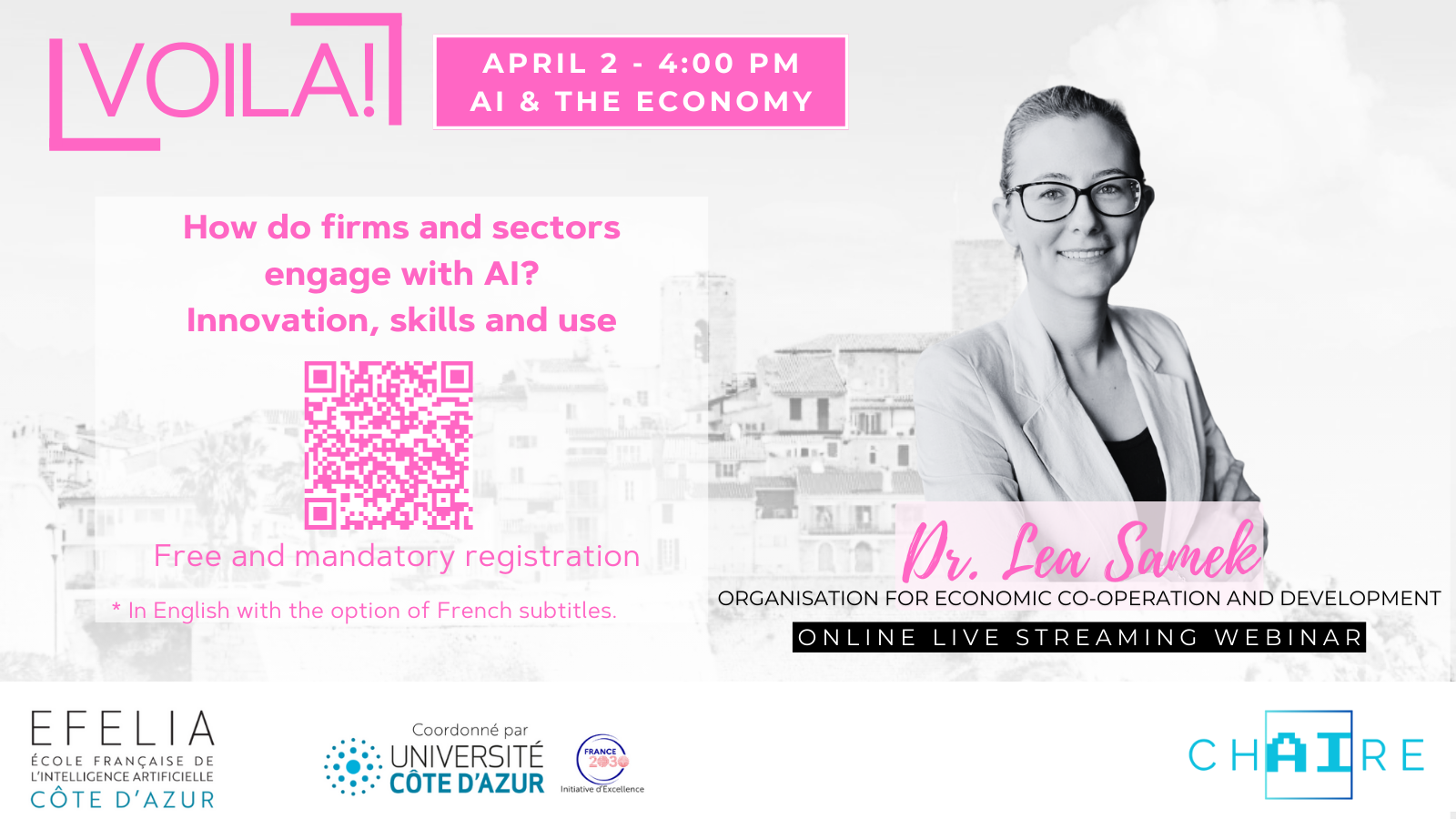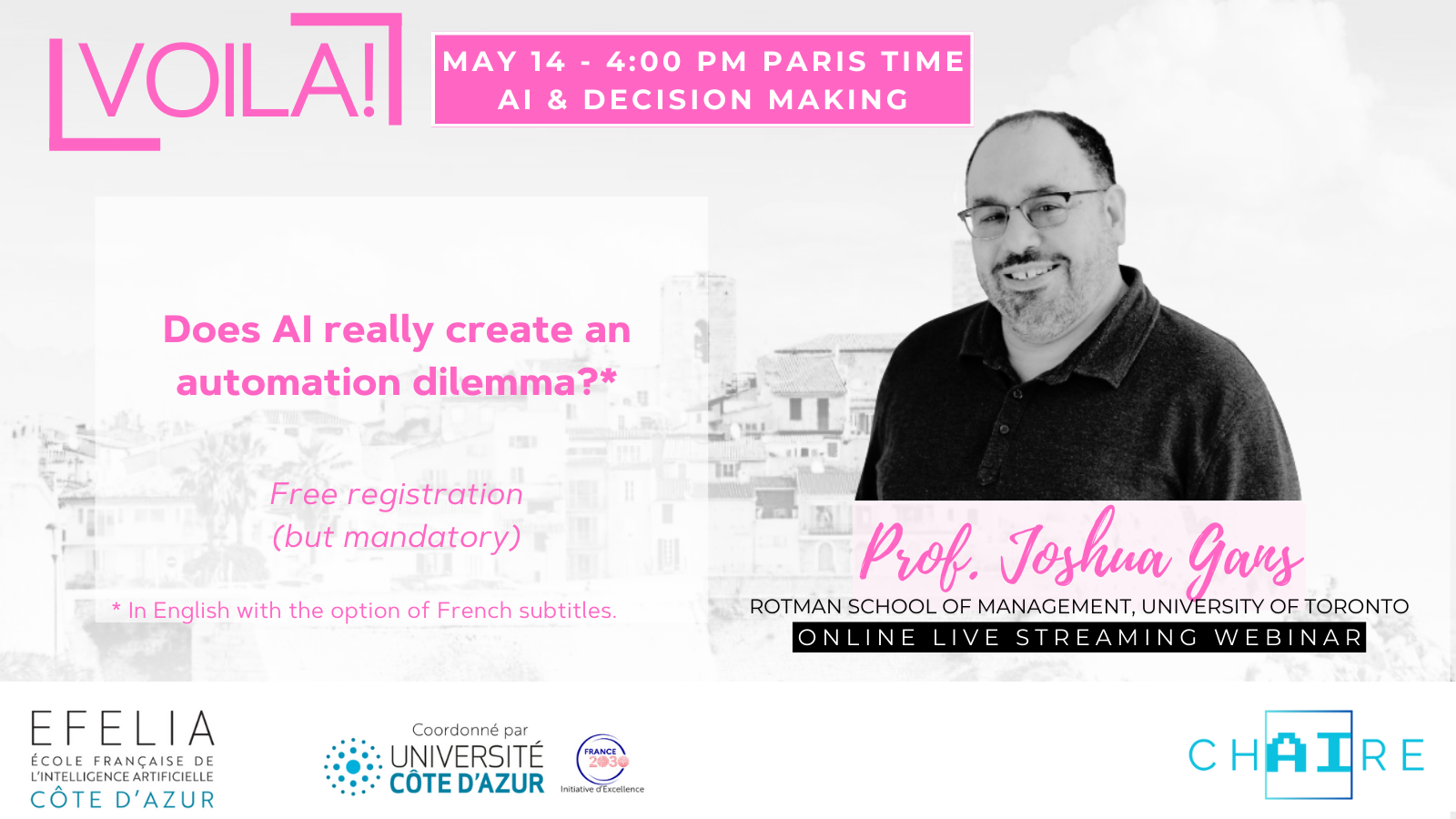New season
EFELIA Côte d'Azur, in conjunction with the Chair in AI and Innovation Economics, is launching its seminar series whose name, combining French and English, underlines its openness: Visions Of InteLligence Artificielle, VOILA!
VOILA! seminars explore the frontiers of AI in a way that is inclusive and open to all. They are designed to scientifically animate the large EFELIA Côte d'Azur community, made up of teaching and research staff, students and ecosystem partners. The aim is to provide food for thought or answers to the major questions facing society, and hence the university community, on themes such as AI & Environment, AI & Work, AI & Education, AI & Media, AI & Law, AI & Creation, AI & Health, and more.
Each seminar consists of 2 parts: a lecture from 4:00 pm to 5:00 pm by an expert, followed by a round-table discussion from 5:00 pm to 5:30 pm led by Université Côte-d'Azur researchers.
Seminars are mostly held online, and are given in English or French (with the option of automatically translated subtitles, to ensure maximum accessibility). Occasionally, a hybrid format will be offered, with complimentary refreshments. They are also recorded and posted online at a later date (subject to acceptance by the speaker) on YouTube.
These seminars are accompanied by the publication of our "Understanding AI" page. Consisting mainly of organized, explained and freely accessible content, it is accessible to anyone wishing to understand what AI is, what it stands for, what is at stake, its limits and possibilities, in the broad socio-technical context in which this fully-fledged field is developing and whose systems are changing society..
Registration is free, but is required to receive the connection link on the morning of the event.
VOILA! season 3: ask for the program!
Version française- Wednesday, February 5, 4:00 pm to 5:30 pm (Paris time): AI and security, Pr. Heather Zheng
-
Conference "Experiences and Lessons from Protecting Human Creatives Using Adversarial AI Tools"
By Pr. Heather Zheng
How do I activate subtitles during the Zoom seminar?
1. Locate the "Subtitles" or "CC" button in the Zoom toolbar at the bottom of the screen.
2. Click on the "Subtitles" button to open the subtitle settings.
3. Click on the option to activate them.
Registration is now closed.
VOILA! S03E01 : Heather Zheng, University of Chicago - IA et sécurité
Abstract
Generative AI has transformed our society in many ways, introducing new benefits along with significant harms to human creatives through its misuse. The SAND lab at University of Chicago Computer Science has been working for some time to help protect human creatives against these harms. SAND released Glaze in March 2023, a tool designed to provide protection to individual artists against style mimicry attacks commoditized by platforms such as civitai. Since its release, Glaze has been downloaded more than 6.5 million times by artists around the globe. Later in January 2024, SAND released Nightshade, a tool that helps restore some balance in the power dynamics between content and IP owners, and genAI model trainers who seek to scrape content for training. In this talk, Heather Zheng will describe both Glaze and Nightshade, and her experiences in deploying them.
Bio
Pr. Heather Zheng is the Neubauer Professor of Computer Science at University of Chicago. She received her PhD from University of Maryland, College Park. Prior to joining University of Chicago in 2017, she spent 6 years in industry labs (Bell-Labs and Microsoft Research Asia) and 12 years as a faculty at University of California at Santa Barbara. At UChicago, she co-directs the SAND Lab (Security, Algorithms, Networking and Data) together with Prof. Ben Y. Zhao. She was one of MIT Technology Review’s Innovators under 35 in 2005; her research on cognitive radios was featured by MIT Technology Review as one of the 10 Emerging Technologies in 2006. More recently, her work on protecting human artists against unethical data exploration received the USENIX Internet Defense Prize, the Chicago Innovation Award, a special mention in TIME Magazine Best Inventions of 2023, and the Community Impact Award from the Concept Art Association in 2024. She is a fellow of ACM and IEEE, and has served on several editorial boards and steering committees for journals and conferences.
Schedule
The round-table discussion following the conference will address the theme of AI & security, and will be moderated by Chiara Galdi and Sanju Ahuja, researchers from Université Côte d'Azur.
Pr. Zheng's presentation and the round-table will be in English, with the option of French subtitles. - Wednesday, February 26, from 4:00 to 5:30 p.m. (Paris time): AI and (non)existential risk, Pr. Jack Stilgoe
-
Conference "The organized irresponsibility of artificial intelligence"
By Pr. Jack Stilgoe
How do I activate subtitles during the Zoom seminar?
1. Locate the "Subtitles" or "CC" button in the Zoom toolbar at the bottom of the screen.
2. Click on the "Subtitles" button to open the subtitle settings.
3. Click on the option to activate them.
Replay of the conference "The organized irresponsibility of artificial intelligence" available on our YouTube channel.
Registration is closed.
VOILA! S03E02 : Jack Stilgoe, University College London - IA et risque non existentiel
Abstract
As the promises of artificial intelligence attract growing social, political and financial attention, risks and responsibilities are being imagined in ways that serve the interests of a technoscientific elite. In the UK and elsewhere, organisations are starting to institutionalise a mode of governance that presumes to know and take care of public concerns. And new research communities are forming around questions of AI ’safety’ and ‘alignment’. In this talk, Jack Stilgoe will draw on research into public and expert attitudes and reflect on his role as a proponent, analyst and actor in debates about ‘Responsible AI’.
Bio
Pr. Jack Stilgoe is Professor of Science and Technology Studies at University College London, where he studies the governance of emerging technologies. He is a member of the UKRI Responsible AI leadership team. He was principal investigator of the ESRC Driverless Futures project (2019-2022). He worked with EPSRC and ESRC to develop a framework for responsible innovation that is now used by the Research Councils. Among other publications, he is the author of "Who's Driving Innovation?" (2020, Palgrave) and "Experiment Earth: Responsible innovation in geoengineering" (2015, Routledge). Previously, he worked in science and technology policy at the Royal Society and the Demos think tank. He is a Fellow of the Turing Institute and a Trustee of the Royal Institution.
Schedule
The round-table discussion following the conference will address the theme of AI & (non) existential risk, and will be moderated by Prof. Lucile Sassatelli, Full Professor at Université Côte d'Azur, and Prof. Simone Vannuccini, Junior Professor Chair in the Economics of Artificial Intelligence and Innovation at Université Côte d'Azur.
Pr. Stilgoe's presentation and the round-table will be in English. - Wednesday, March 5, 4:00 pm to 5:30 pm (Paris time): AI and neuroscience, Pr. Romain Brette
-
Conference "Brains beyond computers"
By Pr. Romain Brette
How do I activate subtitles during the Zoom seminar?
1. Locate the "Subtitles" or "CC" button in the Zoom toolbar at the bottom of the screen.
2. Click on the "Subtitles" button to open the subtitle settings.
3. Click on the option to activate them.
Replay of the conference "Brains beyond computers" available on our YouTube channel.
Registration is now closed.
VOILA! S03E03 : Romain Brette, Institute of Intelligent Systems and Robotics Paris - IA et neurosciences
Abstract
Mainstreams theories of the brain are rooted in engineering concepts, such as computation, code, control, information, reverse-engineering, optimization. Living organisms are machines and the brain is a computer. It is rather ironic that, in the process of expelling God and magic from mind studies, cognitive science has persistently insisted that the brain is a machine, i.e., an artifact made by someone for a purpose using knowledge and planning. But the machine view of life is so engrained in scientific culture that it seems very difficult for many scientists to imagine that living organisms could be something else than machines, or that brains could be something else than computers.
Starting from a discussion of our biological nature, I will show how many traditional concepts of brain and mind science, such as computation, information or prediction, are poorly suited to the study of biological cognition. As it turns out, living organisms are not actually engineered, and this makes considerable differences in the way neurons work, interact with each other, and are organized.
Bio
Pr. Romain Brette is a theoretical neuroscientist at the Institute of Intelligent Systems and Robotics, Paris. He was previously faculty at the Departments of Computer Science and Cognitive Science of Ecole Normale Supérieure, Paris, then in the Vision Institute, Paris. He has authored over 80 articles on various topics in neuroscience, from cellular biophysics to systems neuroscience, psychophysics and philosophy of neuroscience. He was awarded the early career scientific prize from Fondation pour l’Audition for his work on auditory perception, and the Open Science Free Software Award for his development of the neural simulator Brian. His current work lies at the intersection of microbiology and neuroscience, on the integrative neuroscience of protists.
Schedule
The round-table discussion following the conference will address the theme of AI and neurosciences and will be moderated by Pr. Ingrid Bethus, Director of the MSc and member of the IPMC laboratory, and Pr. Simone Vannuccini, Professor of the Economics of Artificial Intelligence and Innovation at the Université Côte d'Azur.
Pr. Brette's presentation and the round-table will be in English , with the option of French subtitles. - Wednesday, April 2, 4:00 pm to 5:30 pm (Paris time): IA and the Economy, Dr. Lea Samek
-
Conference "How do firms and sectors engage with AI? Innovation, skills and use"
By Dr. Lea Samek
How do I activate subtitles during the Zoom seminar?
1. Locate the "Subtitles" or "CC" button in the Zoom toolbar at the bottom of the screen.
2. Click on the "Subtitles" button to open the subtitle settings.
3. Click on the option to activate them.
Replay of the conference "How do firms and sectors engage with AI? Innovation, skills and use" available on our YouTube channel.
Registration is closed.
VOILA! S03E04 : Dr Lea Samek, OCDE - l'IA et l'économie
Abstract
Artificial Intelligence (AI) has the potential to transform economies, reshape how people work, and change how firms organise their production. To fully harness the opportunities brought by AI, it is important to assess the current state of AI's diffusion in firms and sectors. In this context, this seminar will introduce a recently published sectoral taxonomy of AI intensity, outlining different dimensions (AI human capital, AI innovation, exposure to and use of AI) that characterise the extent to which AI relates to the activity of economic sectors. The presentation will explore critical aspects in greater depth, including the skills needed to develop and maintain AI, as well as the technologies and applications driving recent advancements in AI.
Bio
Lea Samek is an Economist at the Organisation for Economic Co-operation and Development (OECD) in the Science, Technology and Innovation (STI) Directorate. Her work encompasses a wide array of innovation and industry-policy related topics including knowledge-based capital, the link between innovation and productivity, jobs and skills in the digital transformation, semiconductors and Artificial Intelligence. She is also a Research Associate at the Economic Statistics Centre of Excellence (ESCoE). Previously Lea worked at the National Institute of Economic and Social Research in London and as a Visiting Lecturer at King’s College London, from where she also obtained her PhD.
Schedule
The round-table discussion following the conference will address the theme of AI and neurosciences and will be moderated by Prof. Ulrike Mayrhofer (GRM, IAE, Université Côte d'Azur) and Dr. Franck Michel (I3S, Université Côte d'Azur).
Dr Samek's presentation and the round-table will be in English, with the option of French subtitles. - Tuesday, May 13, 4:00 pm to 5:30 pm (Paris time): AI & decison making, Pr. Joshua Gans
-
Conference "Does AI really create an automation dilemma?"
By Pr. Joshua Gans
How do I activate subtitles during the Zoom seminar?
1. Locate the "Subtitles" or "CC" button in the Zoom toolbar at the bottom of the screen.
2. Click on the "Subtitles" button to open the subtitle settings.
3. Click on the option to activate them.
Replay of the conference "Does AI really create an automation dilemma?" available on our YouTube channel.
Registration is closed.
VOILA! S03E05 : Pr Joshua Gans, University of Toronto - IA et prise de décision
Abstract
This talk will examine the relationship between AI and automation and whether, in fact, automation is likely to be the issue many are claiming. It will show how AI invariably has a human element given its current properties and that the main issues arise from too rapid disruption which itself is unlikely given the history of technological change.
Bio
Joshua Gans is a Professor of Strategic Management at the University of Toronto's Rotman School, Chief Economist at the Creative Destruction Lab, and holder of the Jeffrey S. Skoll Chair. A renowned expert in innovation economics, he is a Fellow of the Academy of Social Sciences in Australia and a Research Associate at NBER. He has authored several influential books on AI economics, blockchain, and entrepreneurship, including "Prediction Machines" and "Power & Prediction". His research has been published in top journals including the American Economic Review and Journal of Political Economy. Beyond academia, he leads Core Economic Research and has consulted for regulatory bodies including the US Department of Justice.
Schedule
The round-table discussion following the conference will address the theme of AI and decision making and will be moderated by Université Côte d'Azur researchers.
Pr. Gans's presentation and the round-table will be in English, with the option of French subtitles.

















